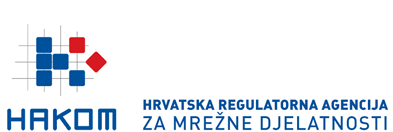HAKOM adopts decision – State budget richer by 290 million HRKPRESS RELEASEHAKOM has adopted a decision on the issuance of licenses for the use of the remaining “digital dividend” spectrum to VIPnet and Hrvatski Telekom. By the payment of licenses, the operators will make an unplanned increase of the State Budget revenue by HRK 290 million.
ZAGREB, 6 November 2013 – HAKOM adopted a decision on the allocation of the radiofrequency spectrum of the remaining “digital dividend”, the radiofrequency area which was used for analogue television until recently, to two largest mobile operators – VIPnet and Hrvatski Telekom. In November already, the operators will have to pay a total of HRK 289 million to the State Budget for the licenses. The annual fees for the use of the radiofrequency spectrum, to be paid in equal instalments until the expiry of the licenses in 2024, will contribute an additional HRK 80 million to the budget over the next 10 years. In taking into account last year’s allocation of the “digital dividend” spectrum, when operators paid a one-off amount of HRK 332 million for two blocks of 2x10 MHz each, also committing to pay annual fees totalling HRK 352 million, the entire “digital dividend” will directly contribute over one billion kuna to the budget of the Republic of Croatia.
In addition to a direct benefit for the State Budget, HAKOM also expects major investments in the mobile operators’ network infrastructure and in new services, as the 4G network provides the users with up to 100 Mbit/s access speed. The allocated frequencies, suitable for the coverage of rural areas with a smaller population density, will enable the operators to plan their networks more efficiently, while the accessibility of fast Internet will decrease the “digital gap” between urban and rural areas. The increased broadband access density, enabled by the “digital dividend”, is expected to have a positive impact on the economy as a whole, particularly in less developed areas. At this year’s public auction of the “digital dividend” spectrum with the criterion of the highest offered price for the individual frequency block, bids for two blocks of 2x5 MHz for the provision of LTE-based communication services were submitted by VIPnet and HT. The highest price for the first block was offered by VIPnet (HRK 110,144,999), and for the second by HT (HRK 105,652,000). In its bid, VIPnet committed to pay the annual fees one-off, i.e. a total of HRK 65 million, while HT opted for the payment of annual fees in equal yearly instalments in the amounts of HRK 8 million each, until the expiry of the license. # # # For additional information please contact: Croatian Post and Electronic Communications Agency (HAKOM) Roberta Frangeša Mihanovića 9 10110 Zagreb, Croatia Tel. + 385 (0)1 700 70 07 Fax + 385 (0)1 700 70 70 Media inquiries can be submitted online using HAKOM’s official website: https://www.hakom.hr Registration required. About HAKOM:
HAKOM (www.hakom.hr) – Croatian Post and Electronic Communications Agency – ensures preconditions for a fair market competition, stable growth and environment for innovations in the electronic communications and postal services market. HAKOM protects users’ interests and the possibility of choice among various communications and postal services at affordable prices, defines sustainable competitive conditions for operators and service providers under fair conditions for return on investment, and provides support to economic growth, public services and the quality of life in the Republic of Croatia by using modern technologies. HAKOM’ strategic goals are: to promote regulation of the electronic communications and postal services market, to support growth of investments and innovations in the electronic communications and postal services market, to provide efficient use of limited resources, to accelerate the growth of broadband products and services, to provide affordable offers of communications and postal services, to provide protection and informing of users, to build an efficient and comprehensive information system, to define and implement efficient processes, and to acquire multi-disciplinary competencies in market regulation.
|
 |
|
|